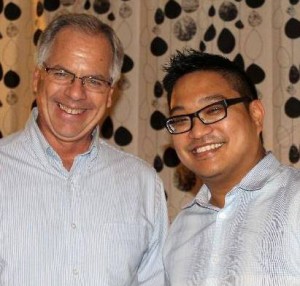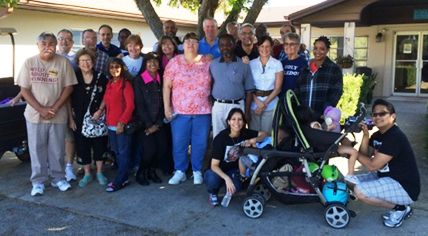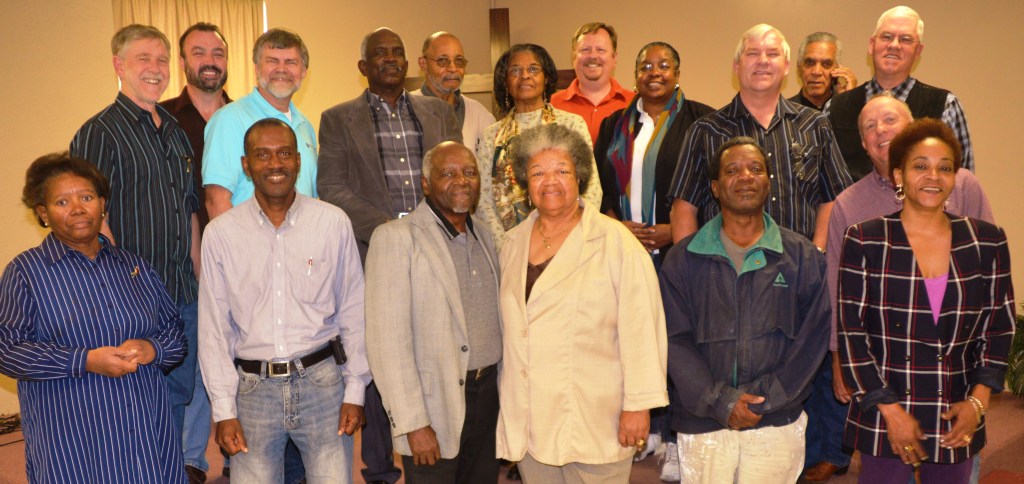Here is part one of a two-part article by Gary Deddo. For part two, click here.
Christians often joyfully proclaim that “Jesus accepts everyone” and “does not judge anyone.” Though there is gospel truth in these affirmations, I find that people assign to them a wide range of different meanings. Unfortunately, some of those meanings seem to differ from the revelation of Jesus that is given to us in the New Testament.
In GCI circles, we often use the phrase, “You’re included.” That simple statement conveys an important point. But it too can be (and has been) understood in a variety of ways. What exactly are we included in? Answering this and related questions calls for care as we, in faith, seek to sort out the related issues so that we are accurate and thus faithful to the biblical revelation.
Jesus certainly did welcome all into his presence and offered himself and his teaching to all who came toward him. In fact, he told his listeners that he would draw all persons to himself (John 12:32). Indeed, we find no instances where Jesus rejected someone, turning away from or refusing someone who was seeking him out. More than that, Jesus received and even shared meals with the sorts of people who were being rejected by many of the religious leaders of his day.
What stands out in the biblical record is the fact that Jesus welcomed and interacted with lepers, the lame, blind, deaf and dumb. He interacted socially with women (some with questionable reputations) and did so in ways that ignored religious regulations of the day. Jesus also spent time with adulterers, with Jewish tax collectors working under Roman direction, and even with fanatical anti-Roman political activists.
Furthermore, Jesus spent time with the Pharisees and Sadducees, religious leaders who were his most severe critics (including some who plotted his execution). The apostle John tells us that Jesus did not come to condemn, but to save and rescue people for God. Jesus said, “whoever comes to me I will never drive away” (John 6:37). He also instructed his disciples to love their enemies (Luke 6:27), forgive those who wronged them and bless those who cursed them (Luke 6:28). Jesus also extended forgiveness to his executioners at the moment of his crucifixion (Luke 23:34).
What comes across in these examples is that Jesus came to benefit all—he was “on the side” of everyone, he was “for” everyone. He is God’s grace and God’s salvation for all. The rest of the New Testament outside of the Gospels summarizes what we see lived out in Jesus’ life. Paul indicates that Jesus came to atone for the sins of the ungodly, the sinners—those “dead in their sins” (Ephesians 2:1).
The attitude and acts of Jesus clearly demonstrate God’s love for all human beings and his desire to be reconciled to all and to bless all. Jesus came to give life and to give it abundantly (John 10:10 NRSV). God was in Christ reconciling the world to himself (2 Corinthians 5:19). Jesus came as a ransom to free captives of sin—their own and the evil done against them.
But there is more to the story—a “more” that should not be viewed as contradicting or in tension with what we just surveyed. Contrary to the view of some, there is no necessity to think that there are contrasting or conflicting aspects within Jesus’ heart, mind and purposes. There is no need to see some sort of internal balancing act, now tipping one way then correcting and tipping the other. There is no need to think that Jesus is trying to accomplish two divergent things at the same time such as love and righteousness or mercy and holiness. Such imagined tensions might exist within us in our fallenness, but they do not exist within the heart of Jesus or his Father.
Jesus, like the Father, welcomes all people. However, he does so with a particular purpose in mind. His love has direction to it. He engages all who will listen to reveal something that is generally hidden. He came to give something in particular—to serve all in a way that points in a particular direction, that has a certain goal or end in mind.
Rather than an end point, his welcome to all is the starting point of an ongoing relationship. That relationship is one of his giving and serving and of our receiving what he offers. Jesus does not offer any old thing or serve us in any old way (including the way we might prefer). Rather, he offers us only the best that he has—and that is himself. And in offering himself he gives us the way, the truth and the life. Nothing more. Nothing else.
Jesus’ attitude and acts of receiving and welcoming call for a certain response to his self-giving. In essence, it calls for receiving what he offers. In contrast to that receptive response, there is the response of rejecting what Jesus offers, which means rejecting Jesus himself. By Jesus drawing all people to himself he is looking for the response of reception. And as Jesus indicates, that response requires a certain attitude, a certain approach toward him.
Jesus thus announced to his disciples that in his presence the kingdom of God had drawn near. All of the kingdom’s blessings are available in him. However, Jesus immediately indicated what response that truth and reality calls for: “Repent and believe in the good news” of the kingdom’s arrival. A refusal to repent and put faith in Jesus and his kingdom amounts to a rejection of Jesus and the benefits of his kingdom.
A willingness to repent requires an attitude of humble receptivity. And that is what Jesus is looking for in extending his welcome, his acceptance. For it is only through humility that we are able to receive what Jesus has offered. And note that Jesus offers his gift before any such response is made. In fact, it is the offer of the gift that calls forth the response.
Repentance and belief are thus the responses of reception to what Jesus has already offered. Those responses are not behaviors or attitudes that pre-condition Jesus’ offer, or determine to whom he makes the offer. Jesus’ offer is for the sake of its reception—not for the sake of its rejection. Of what benefit would such rejection be? None.
The receptive attitude Jesus is always looking for in response to his offer of himself is indicated in a variety of his sayings: “For the Son of Man came to seek and save the lost” (Luke 19:10 NRSV). “It is not the healthy who need a doctor, but the sick” (Luke 5:31). “Truly I tell you, anyone who will not receive the kingdom of God like a little child will never enter it” (Mark 10:15). We must be like the soil that “receives the word” of the sower “with joy” (Luke 8:13). “Seek first his kingdom and his righteousness” (Matthew 6:33).
Receiving what Jesus offers, and so benefitting from what he gives, requires acknowledging that we are lost and need to be found, that we are ill and need a physician to heal us, that we come to Jesus to receive with empty hands, not hoping to make an exchange with him. For like a child we do not presume to have anything that he needs. This is why Jesus indicates that it is the “poor in spirit” who are receiving the blessings of God and his kingdom, not those who regard themselves as spiritually rich (Matthew 5:3).
Christian teaching has summarized this attitude of receptivity to what God in Christ freely offers to all his creatures as one of humility. This is an attitude that admits that we are not self-sufficient but must receive life from our creator and redeemer. The opposite of such a trusting and receptive heart has been called pride. In the context of church teaching, pride is an attitude that asserts autonomy from God, a trust in oneself, a confidence in one’s own adequacy, even in the face of God. Such pride is offended by the suggestion that one needs to receive anything significant from God, most especially his forgiveness and mercy. Pride then results in a self-righteous refusal to receive anything essential from God, particularly those things you think you can provide for yourself. Pride insists on paying its own way, getting what it deserves. It insists that it does not need grace or charity from God—that it can provide itself with life sufficient for its own purposes. Pride refuses to “be beholden” to anyone or anything, including God. Pride says nothing really needs to be changed in us. We are fine just as we are. In contrast, humility recognizes that one cannot give oneself life. Instead, it admits its need not only for help, but for the transformation, renewal, restoration and reconciliation that only God has to give. Humility acknowledges our inexcusable fault and our utter helplessness to renew ourselves. We need total grace from God or we are lost. Our pride needs to be put to death that we might receive life from God himself. Receptivity to receiving what Jesus has to offer and humility are inseparable.
In the end, Jesus welcomes all in order to give them himself. His welcome is thus purposeful. It leads somewhere. His purpose necessarily includes what reception of him requires. Jesus tells us that he has come to enable the worship of his Father (John 4:23). This is his most comprehensive way of indicating the purpose of his welcome and acceptance of us. Worship is a way of indicating a total response to who God is as the only one who is worthy of our ultimate trust and loyalty. Jesus’ self-giving leads to a true knowledge of the Father and a receptivity to his Holy Spirit. It results in worshipping God alone through the Son and in the Spirit, that is, to worshipping God in truth and in spirit. For in offering himself to us, Jesus gives himself to be our Lord, our prophet, priest and king. In doing so he reveals the Father and sends us his Spirit. He gives of himself according to who he is, not according to who he is not, nor according to our wishes or imaginations.
And this means that Jesus’ way involves discernment—it does sort through and notice the kinds of responses made to him (and to all that he offers). Jesus recognizes those who are rejecting him and his word and so those who are rejecting a true knowledge of God and right worship. He discriminates between those who are receiving and those who are not receiving. However, this discrimination does not mean that Jesus has a different attitude or intention other than that which we surveyed above. There is no reason to suppose that Jesus’ love is diminished or contradicted by his acts of discernment. Jesus does not condemn those who reject his welcome and invitation to follow him. But he does warn them concerning the consequences of such rejection. Jesus’ acceptance and love calls for a particular kind of response, not giving no response or any sort of response.
Next time, in the second part of this article, we’ll look more at that response.
 It’s good to evaluate our church events—thinking about their effectiveness. A post at ChurchLeaders.com provides 20 questions (reproduced below) to ask in evaluating outreach events. Perhaps you can think of other questions to add to the list. Feel free to share them using the “add a comment” tool below.
It’s good to evaluate our church events—thinking about their effectiveness. A post at ChurchLeaders.com provides 20 questions (reproduced below) to ask in evaluating outreach events. Perhaps you can think of other questions to add to the list. Feel free to share them using the “add a comment” tool below.

 A new GCI church was launched recently in Masterton, New Zealand. Of the 25 people who attended the first service (pictured below), most came from the nearby community, including friends and colleagues of Manny Ornejas (pictured at right) who helped plant the church. Manny had pastored in the Philippines prior to moving to New Zealand to work as a beekeeper. He found a sizeable Filipino population in Masterton and discovered that many of them do not have a church home. The new church is reaching out to this group of unchurched people.
A new GCI church was launched recently in Masterton, New Zealand. Of the 25 people who attended the first service (pictured below), most came from the nearby community, including friends and colleagues of Manny Ornejas (pictured at right) who helped plant the church. Manny had pastored in the Philippines prior to moving to New Zealand to work as a beekeeper. He found a sizeable Filipino population in Masterton and discovered that many of them do not have a church home. The new church is reaching out to this group of unchurched people.







